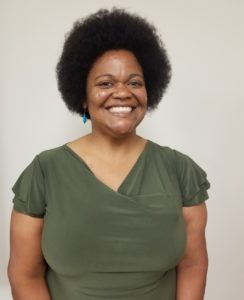Jennifer E. Cupp is a multipronged supporter of Maryland Humanities. The seven-time Maryland History Day volunteer has also been a donor since 2015. A Training Consultant with the Veteran Benefits Administration (part of the U.S. Department of Veterans Affairs), Jennifer spoke to us about what makes our organization unique and the importance of the humanities.
 Q: What drew you to Maryland Humanities?
Q: What drew you to Maryland Humanities?
A: I would say relationships. Aaron [Heinsman, Director of Advancement] and my sister have been friends since their days at the University of Texas at Austin…My husband and I moved to Maryland in 2014. Anytime I move to a new city, my desire is to be involved with the community wherever I’m at.
In 2015, Aaron reached out to see if we wanted to volunteer for Maryland History Day. My husband volunteered to be one of the [Maryland History Day] judges for the website and I volunteered to be one of the runners that directed students, parents, and sponsors knew where to go. Ever since that time, I was hooked. Once learning about and volunteering for Maryland History Day, from then on, I was hooked.
Q: What is the most satisfying part of supporting Maryland Humanities?
A: For me, it’s witnessing the actual impact and the potential impact of the reach Maryland Humanities has across generations, across [people of different backgrounds], things like that. An example of that would be One Maryland One Book (OMOB). Prior to COVID, I took the metro into the city for work and oftentimes I’d be on the metro, and different people would have whatever the OMOB selection is. Knowing there’s that one program that impacts the lives of different people, is an example of that impact and reach. If you want to sprout conversation with someone reading the OMOB you could.
Q: What makes Maryland Humanities a unique organization?
For me, what makes Maryland Humanities unique, it brings me back to what enriches us, whether it’s through reading or understanding our culture, our history of where we are. It allows us as a community to focus what makes us a community, a culture, and just brings us back to how a society should understand itself to improve itself. [Maryland History Day for example] allows students to focus on…students, teachers, on a single topic. For an entire school year, kids get to focus in on this collective thought process. Imagine if that were something that society did at every level, what we could accomplish and do. It’s just that exponential impact making a society understand itself, its present and its future. It’s something [exponential impact] that in my career I’ve sought.
Q: Is there anything else you would like to add?
I just want to encourage others to get involved when it’s safe again. Sitting in a room [during Maryland History Day]. witnessing, especially at a junior level project. To sit in that room, they’re doing something many of us wouldn’t have done at middle or high school…they’re saying, ‘here’s a project that I’ve been working on, all year, allowing stranger…adults to judge them and give them feedback.’ And when you can make a connection with them…you can give them more resources. For example, one year a student did a project on the limited acknowledgement of the use of herbicides (Agent Orange) in Laos leading up to and during the Vietnam War. Through my work with the Veterans Benefits Administration, I was to provide information on additional resources (outside of libraries or online), the student could do in their research on this topic. These are the types of connections we can make across generations, backgrounds, disciplines, etc…when involved with an organization like Maryland Humanities.
Having humanities programs in communities, think about the people at the start of the American Revolution (flaws and all). They were reading books and speeches of their generation and earlier, within their immediate communities and the world, they were having conversations…they were having conversations about freedom from tyranny, right. They didn’t have as much distraction (in terms of social media, celebrity culture, etc). An organization like Maryland Humanities is taking us back to a place…where if we were to engage in that way again, where could we be? We can build a generation of people who can make revolutionary change,
You don’t want to lose sight of what the humanities and all the things that go collectively under the idea the humanities can do. That’s what encouraged some of the greatest things in the world to happen.
Disclaimer: The views and opinions expressed on our blog do not necessarily reflect the views or position of Maryland Humanities or our funders.

